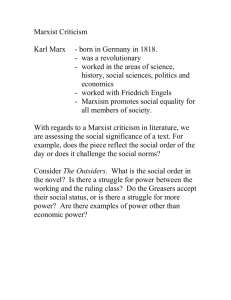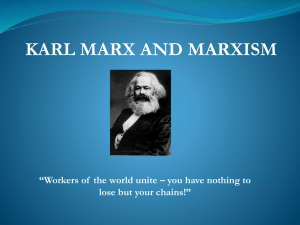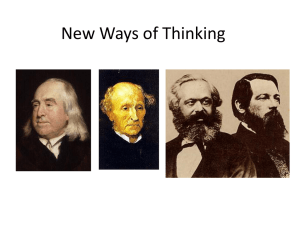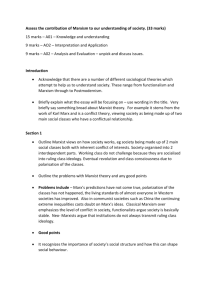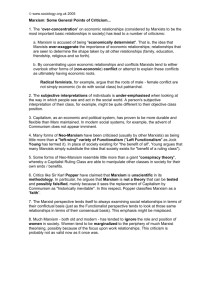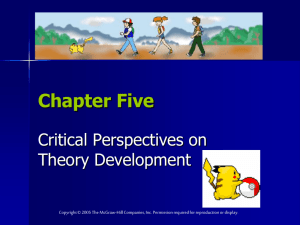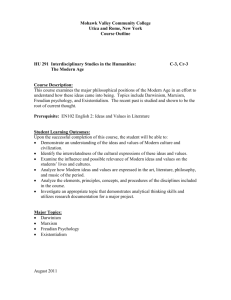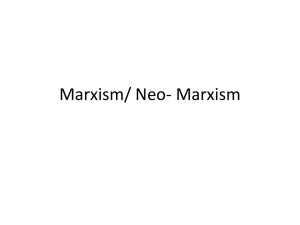Marxism: Literary Theory and Criticism
advertisement
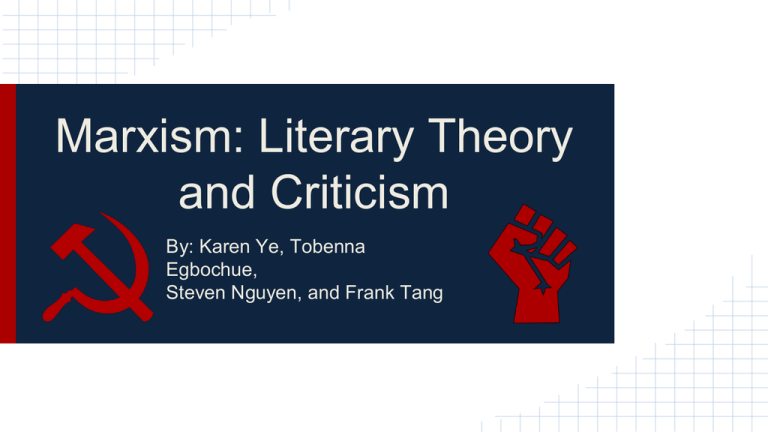
Marxism: Literary Theory and Criticism By: Karen Ye, Tobenna Egbochue, Steven Nguyen, and Frank Tang What is Marxism? Marxism started approximately around the 1930’s and continues in a few countries across the world. ● Most prominent during the Bolshevik Revolution of Russia ○ Fell out of favor with private property ideals and market-exchange system ● Marxism today is mainly found in areas with contemporary communism, such as China, Vietnam, North Korea, Cuba, etc. Founders and Critics ● Founded by Karl Marx and Friedrich Engels o Founded under his dislike for the exploitation of proletariats by capitalism ● Critics would be Vladimir Lenin o Formed Leninism and Marxism - Leninism from Marxism ● Today, several countries practice a degree of Marxism o o Countries like China, Vietnam, and Cuba A handful of young workers around the world support Marxism as well The Values of Marxism ● Alienation ○ State or experience of isolation from a group or activity ● Labor theory of value - the amount of production you accomplish will determine your worth ○ Example: (top to bottom in wealth and importance) ● Factory worker ● Agriculture Worker ● Construction worker ● Office worker ● Congressman guys where the heck am i why wasn’t i invited to the party Frank Tang Tobenna Egbochue Steven Nguyen Factory Workers Office Workers Congressmen President Jack Gayle The Values of Marxism (cont.) ● Materialist concepts - physical items (materials) contain more worth than spiritual items ○ Items hold more value to Marxists than people ○ This also means that the product that workers produce are worth more than the people producing it. ■ As long as a person continues to produce product, they are allowed to live, as people are worthless Authors Associated w/ Marxism ● Karl Marx - (with Friedrich Engels) The Communist Manifesto, 1848; Das Kapital, 1867; "Consciousness Derived from Material Conditions" from The German Ideology, 1932; "On Greek Art in Its Time" from A Contribution to the Critique of Political Economy, 1859 Karl Marx wrote a lot; obviously he was the founder ● Leon Trotsky - "Literature and Revolution," 1923 ● Georg Lukács - "The Ideology of Modernism," 1956 ● Louis Althusser - Reading Capital, 1965 ● Frederick Jameson - Marxism and Form, The Political Unconscious, 1971 Marxism in Literary Criticism ● Discusses the themes (briefly) ● Focuses primarily on class warfare of the characters in the story. o Oppression of characters o Giving power to the oppressed eg. How the woman in the story asserts control instead of always listening to the man Questions to Ask ● Whom does it benefit if the work or effort is accepted/successful/believed, etc.? ● What is the social class of the author? ● Which class does the work claim to represent? ● What values does it reinforce? ● What social classes do the characters represent? ● How do characters from different classes interact or conflict? ● How do the character’s social classes reflect his or her oppression or entitlement? Bibliography http://public.wsu.edu/~delahoyd/marxist.crit.html Delahoyde, Michael. "Marxist Criticism." Marxist Criticism. N.p., n.d. Web. 04 Mar.. 2015. https://www.marxists.org/archive/marx/works/1880/05/parti-ouvrier.htm "The Programme of the Parti Ouvrier." Programme of the French Worker's Party. N.p., n.d. Web. 04 Mar. 2015. http://www.nyu.edu/projects/ollman/docs/what_is_marxism.php Ollman, Bertell. "What Is Marxism? A Bird's-Eye View." What Is Marxism? A Bird's-Eye View. N.p., n.d. Web. 04 Mar. 2015. http://www.iep.utm.edu/literary/#H4 Brewton, Vince. "Internet Encyclopedia of Philosophy." Internet Encyclopedia of Philosophy. N.p., n.d. Web. 04 Mar. 2015. http://plato.stanford.edu/entries/marx/ Wolff, Jonathan. "Karl Marx." Stanford University. Stanford University, 26 Aug. 2003. Web. 04 Mar. 2015.
